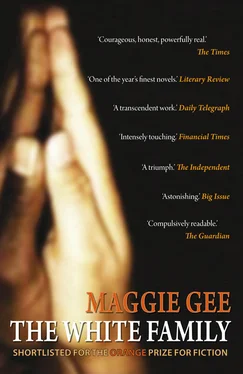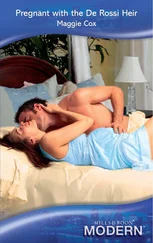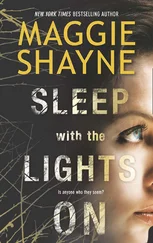But as he turns to look for them, he sees Alfred collapse, fifty metres away, his cap coming off as he wheels and crumples, falling heavily backwards in his army greatcoat as if he has been shot in battle.
And Thomas begins to run, in slow motion, trying to run though his legs have stalled, to the spot where the Park Keeper lies felled, yelling ‘Alfred, I’m coming …’
Darren’s dad.
Alfred White, the Park Keeper.
It’s different in winter. Days are shorter. Alfred’s locked up by half past four. So he’s home in the evenings. We sit for hours. And I get used to him being there. Then when the days get longer, he’s gone. Out all hours. And I’m alone. Never really alone, though. I know he’ll be home. But spring is coming … spring is coming.
We’re like the seasons, we ebb and flow. You take it for granted, after forty-odd years. His key turning. The voice saying ‘May?’ His familiar voice, which will always come, no matter how late, always the same.
I’m proud of him. The job he does. A big job for a little man. Looking after the Park. It’s the best thing we’ve got. In summer I almost start to hate it, because I don’t like his being out till ten, but I know the Park matters more than us.
It’s something we can all share, isn’t it? The place people go to be together. I think it’s the heart of Hillesden, the Park. As London gets dirtier, and more frightening.
We don’t talk a lot. But of course, I do love him.
And there he is. He forgot his sandwiches. I’ve kept them for him, and his tea in the thermos. The clink of the gate, then his feet on the path … Heavier than usual.
Why is he ringing?
Silly old thing, he’s forgotten his key. We’re getting older, both of us …
May opens the door, to smile, to chide. But it’s Thomas, not Alfred. Black shapes behind him. A short policeman in a giant helmet. She furrows her brow, turning back to Thomas …
On his face, the dark, the cold.
May read, as usual, before she went out.
First she got herself completely ready. Alfred’s pyjamas, freshly laundered, neatly folded in a plastic bag inside another, larger plastic bag that held today’s Daily Mirror and a quarter of extra strong mints, just in case he should be feeling a bit better, just in case he should fancy something. It was comforting, getting the bag together. It meant she could still look after Alfred, though she also experienced the usual sense of boredom; women spent their lives looking after men. And even that tiny skin-tag of irritation was comforting, because entirely familiar. The house was so much colder since he had gone.
She was completely ready, hat on, coat fastened, twenty minutes too early to leave for the hospital, even if she walked slowly, even if she dawdled, not that she would dawdle on a day like this, even if she stepped into the Park to have a quick look at the café and the flower-beds so she could report to Alfred later. Each day she had half-meant to do it; each day she had found herself unable to, because she couldn’t bear to see the Park without Alfred. Without the hope of seeing Alfred …
Without the hope of seeing Alfred come hurrying down one of the distant paths, trim, narrow-shouldered in his old army greatcoat and the new check cap she had bought him for Christmas, eyes turned away from where he was going to follow the deeds of some child or dog. Then she might hear him shout or whistle to recall the wrong-doer to order. Not today. That piercing whistle. The Park Keeper’s whistle which had sometimes pained her like the sound of chalk pulled the wrong way across a blackboard now seemed in its absence an arrow of light, a clear white line shooting out across the darkness.
Twenty minutes early. So she sat in her chair as she had done every day this week and began to read, clumsy in her coat, catching its heavy woollen sleeves on the pages.
And again she noticed a difference. It was normally evening time when she read and Alfred would be there, rustling his newspaper or clicking the cards as he laid out a game of patience, and he always said ‘What are you reading?’ in a grumpy, almost affronted way, as if he had failed to entertain her, as if she was rejecting him, and she always made herself answer cheerfully, she always ignored his tone of voice and said ‘Auden, dear,’ or ‘Catherine Cookson, dear,’ though he had been doing it for nearly half a century. But now he had stopped, May found she missed it.
‘Tennyson, dear,’ she whispered in the silence, slipping inside the entirely familiar Victorian patterns in their long cool scrolls, the beloved rhythms of her other Alfred:
He watches from his mountain walls,
And like a thunderbolt he falls.
But she couldn’t concentrate; Alfred, Alfred .
It was still too early, but she picked up her bag, checked its contents and the angle of her hat (for she wanted him to be proud of her; appearances mattered a lot to Alfred), slipped in her book as an afterthought although she knew she’d have no chance to read it, and let herself out into the chill March wind.
She always liked to have a book in her bag. In case she got stuck. In case she got lost. Or did she feel lost without her books? There wasn’t any point, but she liked to have one with her, a gentle weight nudging her shoulder, keeping her company through the wind, making her more solid, more substantial, less likely to be blown away, less alone. More — a person.
Perhaps it was a little piece of the past, since her books all seemed to belong to the past, a far distant past when she was thin and romantic and in love with — what had she been in love with? Life, which seemed to mean happiness then, a word for the future, not the past. Not ‘Life gets you down,’ or ‘That’s life, I’m afraid,’ but life, hope, poetry …
The harsh wind battered her hands and face, pummelling her ears with great noisy blows, and she felt she would never get in through the high red gate-posts of the hospital with their ugly array of cardboard notices, temporary things with clumsy writing … What was she but another piece of scrap, blown willy-nilly across the forecourt? Would the main entrance be closed again because of the endless building works? (They were building new bits all the time, but it never got finished, and the rest was falling down.) She tried to ask a nurse on her way home but the light was already beginning to fade and the wind blew hard between her teeth and turned her voice to a soundless whisper, so the woman passed by oblivious.
I don’t exist. I no longer exist. When Alfred dies, I’ll be nothing, nothing … I couldn’t even read, today. The words were there, but they didn’t help.
I love them still … idyll, ambergris … but maybe they’re no more solid than us. Dirk only reads his computer magazines, Darren never liked poetry, Shirley reads mostly catalogues, so who’ll have my books, after I’m gone?
Twilight and evening bell,
And after that the dark!
And may there be no sadness of farewell,
When I embark …
Onward, onward. Over the threshold. Into the frightening new place which was suddenly part of their life together …
Part of their new life apart. A place where he must go alone, a place where she could only visit.
But she shouldn’t be frightened of this place. It must be one of the last good places. May told herself, this is here for us. We fought the last war for places like this. Hospitals and parks and schools. Not concentration camps, like the other lot had.
A hospital was a place to share. Where all could come in their hour of trouble. The light was harsh, but it shone for all. (Some of the bulbs were dead, she had noticed. Broken glass was replaced with hardboard.)
Читать дальше












